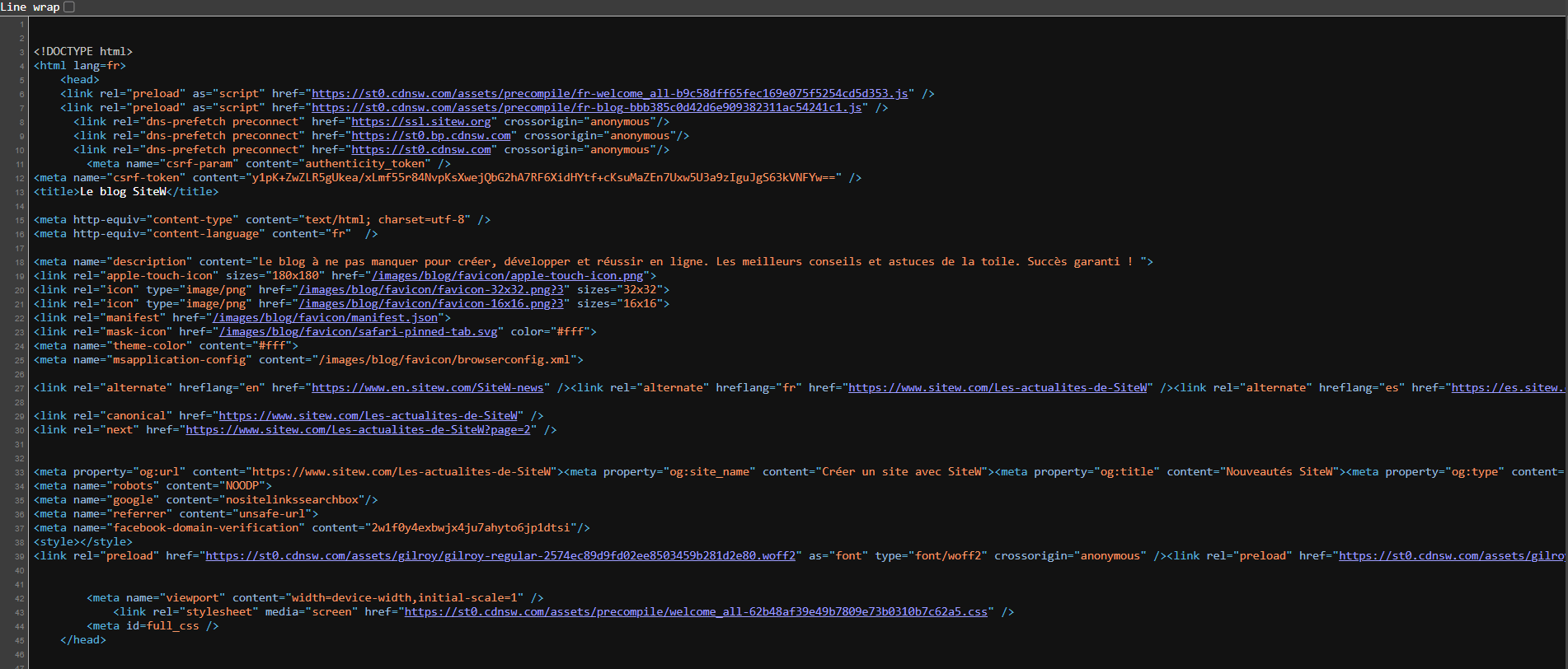Here is how to avoid falling into this fraudulent SEO technique trap... 👇
What is keyword stuffing?
Keyword stuffing is a search engine optimization (SEO) method still practiced today, even if it's somewhat outdated.
Its consists of overloading a page with keywords - either visibly or hidden from readers - to manipulate its ranking on Google, Bing, and other search engines results.

When webmasters first started developing SEO techniques, search engines weren't yet sophisticated enough to distinguish between quality websites and those simply trying to attract traffic.
That's why some people started practicing keyword stuffing. It enabled them to get many visitors by misleading the system.
But today, that no longer works. ⛔
Keyword stuffing is now considered a SEO technique because it's unethical. It's important to avoid it, as it can lead to penalities from search engines and damage the user experience.
Reminder
White hat and black hat are common terms in the SEO field. To simplify, white hat refers to good SEO techniques recommended by search engines, while black hat refers to bad methods that break the rules.
⚠️ Even though keyword stuffing is now considered a fake SEO method, you must be careful because many companies still do it accidentally when they start doing SEO.
Even if it's an innocent and honest mistake, it can be very costly for brands, as they may see their rankings plummet in the results pages.
This is because search engines such as Google use algorithms to detect and penalise sites that engage in keyword stuffing, which is considered a form of spamming.
Conclusion
If you want to optimize your website for search engines, avoid keyword stuffing and instead focus on so-called white hat SEO tactics to improve your page rankings, your content, and your site's traffic.
Why are keywords so important? How does keyword stuffing work?
To understand what keyword stuffing is, you first need to understand the issues surrounding keywords in general.
Keywords are used to help Internet users find the pages on your website.
For example, if you sell organic cotton bibs for babiesn you don't want web users to visit your online shop if they're looking to buy pumps or DIY products - you want visitors who are specifically interested in childcare equipment. 👶
With this in mind, all your web pages should contain text with keywords related to childcare-related accessories. The same applies to all your web advertising and SEO strategies.

To understand how keyword stuffing works, we first need to understand how search engines rank websites.
When a user types a query into Google, the algorithm scans the web for pages that match the user's request and ranks them according to their relevance and quality. The better a web page is ranked, the more likely it is to be viewed and visited.
Some webmasters try to improve their rankings on the SERPs by including a very large number of keywords on their pages, hoping that the search engine will interpret the content as being more relevant to a particular query.
The 2 types of keyword stuffing
There are two main types of keyword stuffing: visible and hidden. Search engines can detect both.
👉 Visible keyword stuffing
This is the most obvious form, involving the unnatural and excessive inclusion of keywords in website content. It can make the page difficult to read and understand, leading to a poor user experience. Examples include:
- Unnecessary repetition of words
- Addition of keywords out of context
- Use of keywords unrelated to the subject
👉 Hidden keyword stuffing
This type of stuffing is designed to be hidden from users, but still visible to search engines. It is generally done in the following ways:
- Hiding keywords by using similar colors for text and background, or using very small fonts.
- Inserting keywords into the source code of pages, meta descriptions, alt tags, and comments.
- Populating landing pages with specific keywords: this involves creating multiple pages with identical or very similar content, each optimized for a specific keyword or set of keywords.

Why is keyword stuffing considered a bad SEO practice?
Keywords help identify the specific topic of a page, but they also make the page easier to find for people searching for information on that precise subject.
In this context, why doesn't keyword stuffing work? 🤔
The first reason is that it offers a poor experience to your readers: nobody wants to read a text filled with repeated words that offer no added value.
Good web content should aim to informe and engage your audience. When you stuff articles with the same keywords, you fail to achieve this objective.
Readers won't be satisfied and will likely leave your website quickly. This will increase your bounce rate and drive people away from your brand.
Webmasters use keyword stuffing to try to attract more traffic to their websites, but it generally has the opposite effect... 🤷
To understand the negative impact of this practice, consider the problems it can cause at different levels:
If you stuff a text with keywords, the content become meaningless. As a result, readers will instantly leave the page.
The audience you want to address may not understand your intention. The objective of keyword stuffing is to mislead Google's bots, not to provide clear explanations to users.
When there are too many word repetitions, coherence is lost and the content's objective is no longer clear.
Now that you know why keyword stuffing is considered a bad practice, let's examine its negative effects... 🔎
Negative effects of keyword stuffing
- Reduced quality of your web pages, lack of user-friendliness
When a page contains too many keywords, its content can become difficult to read and unsertand. Users may leave the page quickly, which can negatively affect your website's ranking.
As mentioned earlier, search engines penalize websites that use this type of deceptive technique. The website may be removed from search results, which can significantly reduce its traffic and revenue.
- Consequences on the website's reputation
Unethical SEO methods can also damage the website's reputation and make it less trustworthy in the eyes of users.
Content overloaded with keywords isn't sharable. If you write a blog article full of repetitions, no one will want to share it. But in a world where social networks play a huge role in spreading the word about a company, it's essential to create content that is appreciated by Internet users in order to grow your brand.
Google itself highlights this in its guidelines: "Filling pages with keywords leads to a negative user experience and can harm your site's ranking. Focus on creating useful, information-rich content that uses keywords appropriately and contextually.
So the question that naturally follows from all this is...
...How to avoid keyword stuffing?
As you can see, it's possible to accidentally stuff keywords if you're not careful.

For example, if you write about a subject and repeatedly use the same term or phrase to refer to a particular topic, you may make your text unpleasant to read.
Furthermore, if you include an excessive number of keywords in the meta descriptions or in the source code of your page, you risk being flagged as spam by search engines.
Using multiple links in the same paragraph is also considered spamming, as the intention behind this practice is the same.
To avoid keyword stuffing - whether intentional or accidental - it's important to create content that is audience-focused rather than designed solely for SEO.
Use keywords sparingly and only when they are relevant to your topic. This will help you rank well in search engines and provide a positive user experience.
Here are a few tips to keep in mind:
Instead of forcing keywords into your content, use them in a natural and relevant way. This will make your text more readable and more appealing to your audience.
When you focus on creating high-quality content, the keywords you want to target will be scattered naturally be scattered throughout your writing.
Google often favors rich, in-depth content - the average word count of pages ranking on Google's first page is around 1,500 words. With longer content, there's no need to force your target phrases where they don't belong, as you'll have plenty of opportunities to include them organically throughout your article.
- Write informative content
It may seem obvious, but many content creators focus so much on minor SEO details that they forget to write high-quality texts that are genuinely useful and informative!
Don't forget that real humans come to your page to learn about a subject and acquire knowledge. You need to do your best to meet their needs, anticipate the questions they want answered, and provide accurate facts and figures.
In other words, write what you would want to read!
- Decline your keywords using variants
Using keyword variants, such as long-tail expressions, can help you avoid keyword stuffing while targeting very specific terms.
So, focus on one main keyword and a few secondary keywords.
Each page of your site should target a single main keyword that corresponds to the search intent of Internet users.
This also helps to avoid keyword cannibalization, which can occur when two or more of your pages compete for the best ranking for the same target terms.
You can also select between 2 and 5 secondary keywords, known as related keywords. These may be variants of the main keyword or expressions closely related to the topic, which can be used several times in place of the main term.
Using synonyms can also help you avoid clutter and better convey your message.

- Use meta descriptions appropriately
Meta descriptions are essential for SEO, but it's important not to over-optimize them by adding too many keywords.
The H1, H2 and H3 tags help structure your content and make it more readable. However, once again, you should avoid overloading them with keywords.
- Opt for the right mix of alt tags
Alt tags are fundamental for SEO, as they help search engines to understand the content of an image. Be creative and avoid over-optimizing them.
Internal links, i.e. links to other pages on your website, can help improve the user experience and make it easier for search engines to crawl and index your site.
Creating an internal linking strategy is another way to optimize your site for SEO. When a large number of links point to one of your web pages for a specific keyword, you are signalling to Google that it's an important page.
However, it's crucial not to overdo it, as too many links can be considered spam.
External links, i.e. links to other websites, can also help to improve the user experience and add credibility to your site.
At the same time, backlinks, which are links to your web pages from other authoritative sites, show search engines that webmasters trust your content and believe it can offer value to their readers.
However, it's important to establish links only with relevant, high-quality websites.
- Optimize your page in other ways
What's more, if you publish in-depth information on a variety of related subjects, search engines will recognize your expertise and consider you an authority in the field.
Optimizing engagement is also of prime importance. Improving the user interface and the visual design can be a valuable advantage in this area. Monitoring your engagement metrics and optimizing them where necessary will strengthen your position in Google's eyes and make your efforts worthwhile.
In conclusion...
In the past, keyword stuffing was an effective way of manipulating search engine rankings because search engines placed great importance on keyword density. Today's algorithms are much more sophisticatedd and can easily detect such excesses.
All in all, this is a practice that site owners and web copywriters should avoid. Not only because it's unethical, but above all because it can harm your website's traffic and reputation.
By focusing on creating useful and relevant content, you can improve your search engine rankings and provide a better experience for your users. 👍





